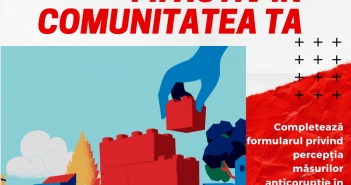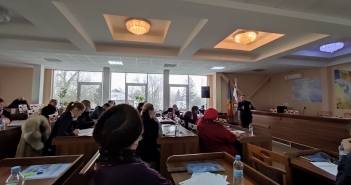The courts created during the occupation of Crimea are not an effective remedy in political cases. This conclusion was drawn by authors of the report Crimean Process: Observance of Fair Trial Standars in Political Cases
The Human Rights Information Center reports that the document was presented in Kyiv.
According to Ukrainian Helsinki Human Rights Union lawyer Daria Svyrydova, the report is based on information provided monitors who attended 174 court hearings in eight trials, namely the trials of Volodymyr Balukh, Suleyman Kadyrov, Igor Movenko, Ilmi Umerov, Akhtem Chiygoz, Mykola Semena, Yevhen Panov and the February 26 case.
The expert explained that the monitoring was conducted in order to assess the capacity of the judicial system created under conditions of the occupation to provide effective protection against unlawful persecution and suppression of rights and freedoms in Crimea.
“To do this, we analyzed four aspects of fair trial standards. These are: independence of the court, equality of arms, presumption of innocence, and publicity,” she said.
The authors discovered a number of factors indicating violations of the presumption of innocence. This was reported by Mariya Yasenovska, President of the Kharkiv Regional Foundation “Public Alternative”.
“This is, first of all, keeping Volodymyr Balukh behind bars at almost every hearing he attended. There is a verdict of the ECtHR that not only declares this a violation of the presumption of innocence, but also considers this a factor that makes the defendant look guilty in the eyes of the court and the public”, said the expert.
She also noted that the media played a major role in these violations by repeating condemning statements made by Crimean officials. In addition, according to Mariya Yasenovska, the authors suspect that the secrecy of the deliberation room is being violated as well.
“This is obvious in Igor Movenko’s case, who was not kept in custody, he himself would show up for the hearings. However, even before the sentence was announced, two guards entered the courtroom as if they already knew what the verdict would be.”
One of the requirements of a fair trial, based on which the experts analyzed these cases, was equality of arms. It grants each side a reasonable opportunity to plead their case under conditions that favor neither one of them.
Sergiy Burov, Executive Director of the Educational Human Rights House Chernihiv and one of the authors, said that the monitors observed multiple instances when the defense was in a less favorable position compared to the prosecution.
“For example, Akhtem Chiygoz was not present at any of the 70 court sessions attended by the monitors. Furthermore, the prosecution was given certain privileges. Thus, in one case, before witness examination, the judge ordered to repeat his previous testimony, stating that the witness could have forgotten what he had said earlier.”
According to Sergey Ostaf, expert of the Resource Center for Human Rights (Chisinau, Moldova), the publicity principle was systematically violated in almost every case – certain sessions were held behind closed doors without good reason; obstacles were created for those wishing to attend the hearings; audio recordings were not allowed, etc.
“In Russia, and in the occupied Crimea in particular, there is no fair trial, all courts carry out the orders of the authorities represented by the FSB,” summed up Ilmi Umerov, Deputy Head of the Mejlis of the Crimean Tatar People, one of those convicted by Russian courts in Crimea.
According to Tetiana Pechonchyk, Head of the Human Rights Information Center, the report will be presented in Brussels next month, and then at other international forums – in the UN, the Council of Europe and others.











